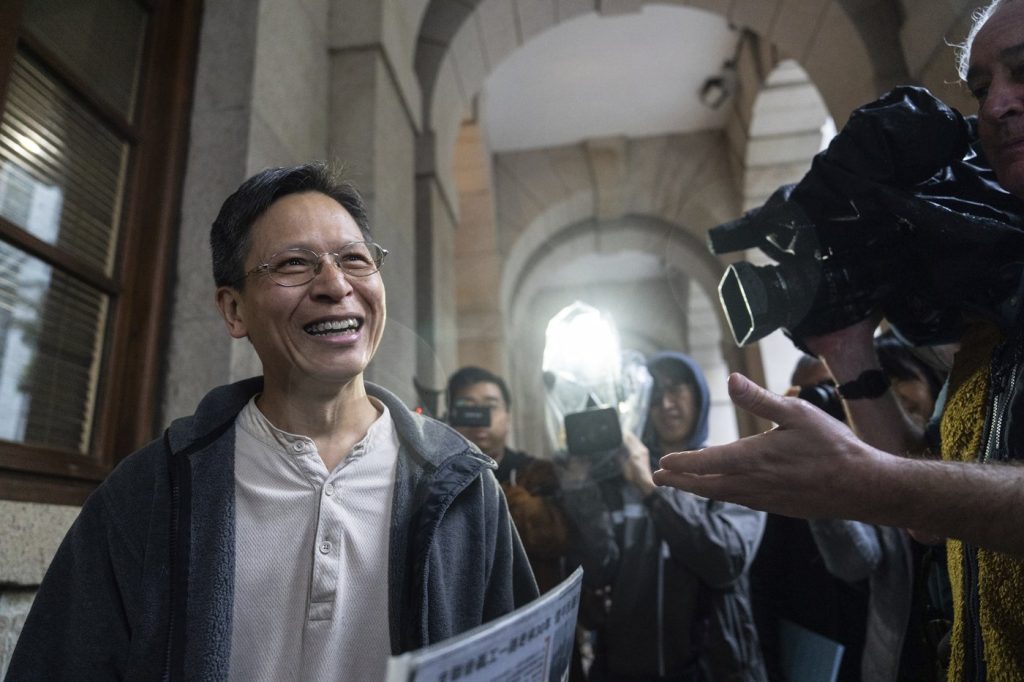HONG KONG (AP) — On Thursday, Hong Kong's top court made a significant ruling by overturning the convictions of three former organizers of the annual vigil commemorating the 1989 Tiananmen Square crackdown. The trio—Chow Hang-tung, Tang Ngok-kwan, and Tsui Hon-kwong—were members of the Hong Kong Alliance in Support of Patriotic Democratic Movements of China. Their previous convictions were tied to their refusal to provide information to police and are seen as a rare victory for pro-democracy activists in the city.
The three activists were convicted in 2023 during a broader crackdown on dissent in Hong Kong following the implementation of a sweeping national security law by Beijing. They received sentences of four and a half months, and they have already completed their terms. The Hong Kong Alliance had historically organized candlelight vigils on June 4 to commemorate the protests in Beijing but disbanded in 2021 due to increasing governmental pressure and legal challenges under the national security law.
Critics argue that such actions highlight the erosion of civil liberties in Hong Kong, counter to the assurances made when the former British colony was handed back to China in 1997. The police had previously sought details about the alliance's finances, alleging that it operated as a foreign agent connected to overseas pro-democracy groups. However, the alliance consistently denied these claims and refused to cooperate with the police's demands.
Judges at the Hong Kong Court of Final Appeal unanimously ruled in favor of the three appellants. Chief Justice Andrew Cheung pointed out that the prosecution was required to substantiate its claim that the alliance was indeed a foreign agent, a burden not met in the original trial. The judges noted that the lower courts had made a critical error by accepting the police commissioner's assertion without adequate evidence. The redaction of key evidential details from the trial severely compromised the fairness of the prosecution's case, leading to a conclusion of miscarriage of justice.
Following the ruling, Tang expressed hope that the decision would affirm the alliance's non-foreign agent status and facilitate a future acknowledgment that the 1989 protests were not a counter-revolutionary riot. He emphasized the importance of justice residing in the hearts of people, irrespective of the legal outcomes. Chow, representing herself in court and having prepared her case while incarcerated, accused the system of enabling abuses typical of a police state and called for an end to such complicity.
Since the introduction of the national security law in 2020, the departures of several overseas judges from the top court have raised concerns about the independence of the judiciary in Hong Kong. However, Chief Justice Cheung asserted that the exit of these judges did not signify a decline in judicial independence. The annual vigil previously held in Victoria Park became a focal point for large-scale public commemoration of the June 4 crackdown but was banned in 2020 on the pretext of anti-pandemic measures. Following the lifting of COVID-19 restrictions, the area has since been dominated by events organized by pro-Beijing groups, with any attempts to memorialize the crackdown resulting in detentions.
Chow and two other former alliance leaders, Lee Cheuk-yan and Albert Ho, are facing additional charges of subversion under the national security law, whereby they remain detained pending trial. In a separate decision made on the same day, the top court denied pro-democracy activist Tam Tak-chi's attempt to overturn his sedition convictions stemming from a colonial-era law used to suppress dissent. Tam's case marked the first instance since the 1997 handover in which someone was prosecuted under the sedition law, leading to multiple convictions, including charges of “uttering seditious words.” The judges ruled that it was unnecessary for the prosecution to show that the statements made incited violence or disorder.
The colonial-era sedition law was repealed last year as the government asserted the necessity of introducing a new security framework to maintain stability, raising ongoing concerns among critics regarding the impact on freedom of expression in Hong Kong.










